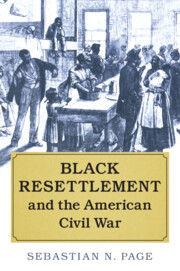Book contents
- Black Resettlement and the American Civil War
- Cambridge Studies on the American South
- Black Resettlement and the American Civil War
- Copyright page
- Dedication
- Contents
- Figures and Maps
- Acknowledgments
- Terminology
- Abbreviations
- Maps
- Introduction
- 1 The Revival of “Colonization,” to 1861
- 2 The Revival of “Emigration,” to 1862
- 3 The Republican Party and Resettlement, to 1863
- 4 Resettlement in Latin America, to 1864
- 5 Resettlement in the European West Indies, to 1865
- 6 Alternatives to Foreign Resettlement, to 1868
- Epilogue
- Index
Epilogue
Published online by Cambridge University Press: 21 January 2021
- Black Resettlement and the American Civil War
- Cambridge Studies on the American South
- Black Resettlement and the American Civil War
- Copyright page
- Dedication
- Contents
- Figures and Maps
- Acknowledgments
- Terminology
- Abbreviations
- Maps
- Introduction
- 1 The Revival of “Colonization,” to 1861
- 2 The Revival of “Emigration,” to 1862
- 3 The Republican Party and Resettlement, to 1863
- 4 Resettlement in Latin America, to 1864
- 5 Resettlement in the European West Indies, to 1865
- 6 Alternatives to Foreign Resettlement, to 1868
- Epilogue
- Index
Summary
If the Civil War had changed policy makers’ attitudes to black resettlement, it was to divide them into supporters of inclusionary and exclusionary forms of the idea. By 1865, the Blairs had come out for the latter – and for the Democratic Party that embodied it. But the Republicans struggled to break from old ways of thinking. When President Ulysses Grant proposed annexing the Dominican Republic as a potential destination for African Americans, but as a fully fledged state of the American Union, his colleagues divided over whether his proposal was radical or reactionary. Meanwhile, in the southern United States, waves of white oppression in the 1870s and 1890s drove African Americans toward the offer of an ACS that, lacking the financial support of times past, struggled to meet demand. As the United States filled with settlers of European descent, and as the great imperialist land-grab left ever fewer foreign locations for African American resettlement, the proto-segregation represented by black colonization morphed into the local segregation with which modern Americans are more familiar.
Keywords
- Type
- Chapter
- Information
- Black Resettlement and the American Civil War , pp. 283 - 290Publisher: Cambridge University PressPrint publication year: 2021

